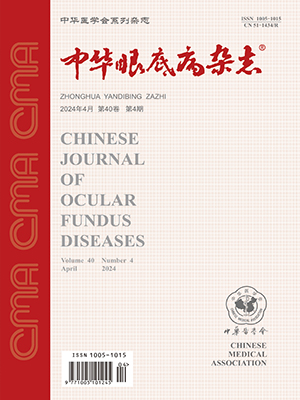| 1. |
Lutty GA, McLeod DS. Development of the hyaloid, choroidal and retinal vasculatures in the fetal human eye[J]. Prog Retin Eye Res, 2018, 62: 58-76. DOI: 10.1016/j.preteyeres.2017.10.001.
|
| 2. |
Apte RS, Chen DS, Ferrara N. VEGF in signaling and disease: beyond discovery and development[J]. Cell, 2019, 176(6): 1248-1264. DOI: 10.1016/j.cell.2019.01.021.
|
| 3. |
Fogli S, Del Re M, Rofi E, et al. Clinical pharmacology of intravitreal anti-VEGF drugs[J]. Eye, 2018, 32(6): 1010-1020. DOI: 10.1038/s41433-018-0021-7.
|
| 4. |
Ng EW, Shima DT, Calias P, et al. Pegaptanib, a targeted anti-VEGF aptamer for ocular vascular disease[J]. Nat Rev Drug Discov, 2006, 5(2): 123-132. DOI: 10.1038/nrd1955.
|
| 5. |
Gragoudas ES, Adamis AP, Cunningham ET, et al. Pegaptanib for neovascular age-related macular degeneration[J]. N Engl J Med, 2004, 351(27): 2805-2816. DOI: 10.1056/NEJMoa042760.
|
| 6. |
Michels S, Rosenfeld PJ, Puliafito CA, et al. Systemic bevacizumab (Avastin) therapy for neovascular age-related macular degeneration twelve-week results of an uncontrolled open-label clinical study[J]. Ophthalmology, 2005, 112(6): 1035-1047. DOI: 10.1016/j.ophtha.2005.02.007.
|
| 7. |
唐仕波, 梁小玲, 胡洁, 等. 玻璃体腔注射bevacizumab治疗年龄相关性黄斑变性的初步临床观察[J]. 中华眼科杂志, 2007, 43(10): 890-896. DOI: 10.3760/j.issn:0412-4081.2007.10.007.Tang SB, Liang XL, Hu J, et al. A preliminary study on intravitreal injection of bevacizumab for treatment of neovascular age-related macular degeneration[J]. Chin J Ophthalmol, 2007, 43(10): 890-896. DOI: 10.3760/j.issn:0412-4081.2007.10.007.
|
| 8. |
Comparison of Age-related Macular Degeneration Treatments Trials (CATT) Research Group, Martin DF, Maguire MG, et al. Ranibizumab and bevacizumab for treatment of neovascular age-related macular degeneration: two-year results[J]. Ophthalmology, 2012, 119(7): 1388-1398. DOI: 10.1016/j.ophtha.2012.03.053.
|
| 9. |
Boyer DS, Antoszyk AN, Awh CC, et al. Subgroup analysis of the MARINA study of Ranibizumab in neovascular age-related macular degeneration[J]. Ophthalmology, 2007, 114(2): 246-252. DOI: 10.1016/j.ophtha.2006.10.045.
|
| 10. |
Brown DM, Michels M, Kaiser PK, et al. Ranibizumab versus verteporfin photodynamic therapy for neovascular age-related macular degeneration: two-year results of the ANCHOR study[J]. Ophthalmology, 2009, 116(1): 57-65. DOI: 10.1016/j.ophtha.2008.10.018.
|
| 11. |
Abraham P, Yue H, Wilson L. Randomized, double-masked, sham-controlled trial of Ranibizumab for neovascular age-related macular degeneration: PIER study year 2[J]. Am J Ophthalmol, 2010, 150(3): 315-324. DOI: 10.1016/j.ajo.2010.04.011.
|
| 12. |
Lalwani GA, Rosenfeld PJ, Fung AE, et al. A variable-dosing regimen with intravitreal Ranibizumab for neovascular age-related macular degeneration: year 2 of the PrONTO Study[J]. Am J Ophthalmol, 2009, 148(1): 43-58. DOI: 10.1016/j.ajo.2009.01.024.
|
| 13. |
Mitchell P, Korobelnik JF, Lanzetta P, et al. Ranibizumab (Lucentis) in neovascular age-related macular degeneration: evidence from clinical trials[J]. Br J Ophthalmol, 2010, 94(1): 2-13. DOI: 10.1136/bjo.2009.159160.
|
| 14. |
Bressler NM, Chang TS, Varma R, et al. Driving ability reported by neovascular age-related macular degeneration patients after treatment with ranibizumab[J]. Ophthalmology, 2013, 120(1): 160-168. DOI: 10.1016/j.ophtha.2012.07.027.
|
| 15. |
Rosenfeld PJ, Rich RM, Lalwani GA. Ranibizumab: phase Ⅲ clinical trial results[J]. Ophthalmol Clin N Am, 2006, 19(3): 361-372. DOI: 10.1016/j.ohc.2006.05.009.
|
| 16. |
Brown DM, Chen E, SAVE Study Group, et al. Super-dose anti-VEGF (SAVE) trial: 2.0 mg intravitreal Ranibizumab for recalcitrant neovascular macular degeneration-primary end point[J]. Ophthalmology, 2013, 120(2): 349-354. DOI: 10.1016/j.ophtha.2012.08.008.
|
| 17. |
Wykoff CC, Brown DM, Croft DE, et al. Two Year SAVE Outcomes: 2.0 mg Ranibizumab for recalcitrant neovascular AMD[J]. Ophthalmology, 2013, 120(9): 1945-1946. DOI: 10.1016/j.ophtha.2013.06.030.
|
| 18. |
Wykoff CC, Croft DE, Brown DM, et al. Prospective trial of treat-and-extend versus monthly dosing for neovascular age-related macular degeneration: TREX-AMD 1-year results[J]. Ophthalmology, 2015, 122(12): 2514-2522. DOI: 10.1016/j.ophtha.2015.08.009.
|
| 19. |
Talks JS, Lotery AJ, Ghanchi F, et al. First-year visual acuity outcomes of providing Aflibercept according to the VIEW Study Protocol for age-related macular degeneration[J]. Ophthalmology, 2016, 123(2): 337-343. DOI: 10.1016/j.ophtha.2015.09.039.
|
| 20. |
Ogura Y, Terasaki H, VIEW 2 Investigators, et al. Efficacy and safety of intravitreal Aflibercept injection in wet age-related macular degeneration: outcomes in the Japanese subgroup of the VIEW 2 study[J]. Br J Ophthalmol, 2015, 99(1): 92-97. DOI: 10.1136/bjophthalmol-2014-305076.
|
| 21. |
Schmidt-Erfurth U, Kaiser PK, Korobelnik JF, et al. Intravitreal Aflibercept injection for neovascular age-related macular degeneration: ninety-six-week results of the VIEW studies[J]. Ophthalmology, 2014, 121(1): 193-201. DOI: 10.1016/j.ophtha.2013.08.011.
|
| 22. |
Lazzeri S, Ripandelli G, Sartini MS, et al. Aflibercept administration in neovascular age-related macular degeneration refractory to previous anti-vascular endothelial growth factor drugs: a critical review and new possible approaches to move forward[J]. Angiogenesis, 2015, 18(4): 397-432. DOI: 10.1007/s10456-015-9483-4.
|
| 23. |
Li X, Xu G, Wang Y, et al. Safety and efficacy of conbercept in neovascular age-related macular degeneration: results from a 12-month randomized phase 2 study: AURORA study[J]. Ophthalmology, 2014, 121(9): 1740-1747. DOI: 10.1016/j.ophtha.2014.03.026.
|
| 24. |
Qu J, Cheng Y, Aurora Study Group, et al. Efficacy of intravitreal injection of conbercept in polypoidal choroidal vasculopathy: subgroup analysis of the Aurora Study[J]. Retina, 2016, 36(5): 926-937. DOI: 10.1097/IAE.0000000000000875.
|
| 25. |
Liu K, Song Y, Xu G, et al. Conbercept for treatment of neovascular age-related macular degeneration: results of the randomized phase 3 PHOENIX Study[J]. Am J Ophthalmol, 2019, 197: 156-167. DOI: 10.1016/j.ajo.2018.08.026.
|
| 26. |
Holz FG, Dugel PU, Weissgerber G, et al. Single-chain antibody fragment VEGF inhibitor RTH258 for neovascular age-related macular degeneration: a randomized controlled study[J]. Ophthalmology, 2016, 123(5): 1080-1089. DOI: 10.1016/j.ophtha.2015.12.030.
|
| 27. |
Dugel PU, Koh A, Ogura Y, et al. HAWK and HARRIER: phase 3, multicenter, randomized, double-masked trials of brolucizumab for neovascular age-related macular degeneration[J]. Ophthalmology, 2020, 127(1): 72-84. DOI: 10.1016/j.ophtha.2019.04.017.
|
| 28. |
Dugel PU, Singh RP, Koh A, et al. HAWK and HARRIER: ninety-six-week outcomes from the phase 3 trials of brolucizumab for neovascular age-related macular degeneration[J]. Ophthalmology, 2021, 128(1): 89-99. DOI: 10.1016/j.ophtha.2020.06.028.
|
| 29. |
Heier JS, Khanani AM, Quezada Ruiz C, et al. Efficacy, durability, and safety of intravitreal faricimab up to every 16 weeks for neovascular age-related macular degeneration (TENAYA and LUCERNE): two randomised, double-masked, phase 3, non-inferiority trials[J]. Lancet Lond Engl, 2022, 399(10326): 729-740. DOI: 10.1016/S0140-6736(22)00010-1.
|
| 30. |
Wykoff CC, Abreu F, Adamis AP, et al. Efficacy, durability, and safety of intravitreal faricimab with extended dosing up to every 16 weeks in patients with diabetic macular oedema (YOSEMITE and RHINE): two randomised, double-masked, phase 3 trials[J]. Lancet Lond Engl, 2022, 399(10326): 741-755. DOI: 10.1016/S0140-6736(22)00018-6.
|
| 31. |
Thach AB, Yau L, Hoang C, et al. Time to clinically significant visual acuity gains after Ranibizumab treatment for retinal vein occlusion: BRAVO and CRUISE trials[J]. Ophthalmology, 2014, 121(5): 1059-1066. DOI: 10.1016/j.ophtha.2013.11.022.
|
| 32. |
Rofagha S, Bhisitkul RB, SEVEN-UP Study Group, et al. Seven-year outcomes in Ranibizumab-treated patients in ANCHOR, MARINA, and HORIZON: a multicenter cohort study (SEVEN-UP)[J]. Ophthalmology, 2013, 120(11): 2292-2299. DOI: 10.1016/j.ophtha.2013.03.046.
|
| 33. |
Busbee BG, Ho AC, Brown DM, et al. Twelve-month efficacy and safety of 0.5 mg or 2.0 mg Ranibizumab in patients with subfoveal neovascular age-related macular degeneration[J]. Ophthalmology, 2013, 120(5): 1046-1056. DOI: 10.1016/j.ophtha.2012.10.014.
|
| 34. |
Wang J, Wang Y, Yu D, et al. Protective effect of a bispecific Fc-fusion protein on the barrier of human retinal pigment epithelial cells[J]. Ophthalmic Res, 2021, 64(4): 656-663. DOI: 10.1159/000515053.
|
| 35. |
Ren X, Li J, Xu X, et al. IBI302, a promising candidate for AMD treatment, targeting both the VEGF and complement system with high binding affinity in vitro and effective targeting of the ocular tissue in healthy rhesus monkeys[J]. Exp Eye Res, 2016, 145: 352-358. DOI: 10.1016/j.exer.2016.02.004.
|
| 36. |
Jiang J, Wang L, Kou X, et al. In vivo characterization of RC28-E, a fusion protein targeting VEGF and bFGF: pharmacokinetics and ocular distribution in primates[J/OL]. Exp Eye Res, 2020, 190: 107823[2019-08-07]. https://pubmed.ncbi.nlm.nih.gov/31600485/. DOI: 10.1016/j.exer.2019.107823.
|
| 37. |
Gao Y, Lu F, Li X, et al. Safety and tolerability of oral vorolanib for neovascular (wet) age-related macular degeneration: a phase Ⅰ, open-label study[J/OL]. Eye (Lond), 2023, 2023: E1. https://pubmed.ncbi.nlm.nih.gov/37041349/. 10.1038/s41433-023-02496-x. [published online ahead of print.
|
| 38. |
Kang-Mieler JJ, Osswald CR, Mieler WF. Advances in ocular drug delivery: emphasis on the posterior segment[J]. Expert Opin Drug Deliv, 2014, 11(10): 1647-1660. DOI: 10.1517/17425247.2014.935338.
|
| 39. |
Lim JI, Niec M, Wong V. One year results of a phase 1 study of the safety and tolerability of combination therapy using sustained release intravitreal triamcinolone acetonide and Ranibizumab for subfoveal neovascular AMD[J]. Br J Ophthalmol, 2015, 99(5): 618-623. DOI: 10.1136/bjophthalmol-2014-306002.
|
| 40. |
Khanani AM, Callanan D, Dreyer R, et al. End-of-study results for the ladder phase 2 trial of the Port Delivery System with Ranibizumab for neovascular age-related macular degeneration[J]. Ophthalmol Retina, 2021, 5(8): 775-787. DOI: 10.1016/j.oret.2020.11.004.
|
| 41. |
Holekamp NM, Campochiaro PA, Chang MA, et al. Archway randomized phase 3 trial of the Port Delivery System with Ranibizumab for neovascular age-related macular degeneration[J]. Ophthalmology, 2022, 129(3): 295-307. DOI: 10.1016/j.ophtha.2021.09.016.
|
| 42. |
Ling S, Yang S, Hu X, et al. Lentiviral delivery of co-packaged Cas9 mRNA and a VEGFA-targeting guide RNA prevents wet age-related macular degeneration in mice[J]. Nat Biomed Eng, 2021, 5(2): 144-156. DOI: 10.1038/s41551-020-00656-y.
|




